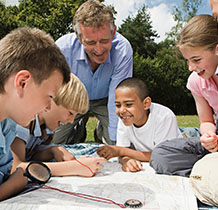Resource Database

Click on a topic or use the search box below to look for a listing:
There are 488 resources. Displaying 10 resources per page.
Having a cohesive community can create a positive educational environment, but it doesn’t always happen naturally. This article from PBS Teachers Lounge outlines 10 ways that educators can build classroom community. Ideas include asking students to define community, providing opportunities for students to share their feelings, and inviting members from the broader community to engage with students.
View Resource
Afterschool Enrichment
Although project-based learning provides an engaging way for students to learn, projects don’t always go as planned. This article from Edutopia describes what happens when a project doesn’t go as planned. Stressing the importance of reflection, benchmarks, and persistence, the authors point out that students can still master content when a project fails. They also stress that teachers can learn something too from these experiences.
View Resource
Afterschool Enrichment
Project-based learning offers an interactive way for students to master skills and engage in their community. This article in The Hechinger Report summarizes some of the data related to one school’s work in project-based learning. School leaders found that students who participated in project-based learning were more engaged and made more interdisciplinary connections than peers who did not participate in project-based learning. They also found that these students performed as well on the state math test as their peers and outperformed them in English language arts.
View Resource
Afterschool Enrichment
Today’s youth face numerous challenges, but many are also passionate about their communities and their futures, and have a unique perspective on the role of education in their day-to-day lives. This article from ASCD Express discusses findings from a CASEL report on youth perspectives about high school and social and emotional learning (SEL). The study found that students believe that there are benefits to attending a high school that promotes SEL, but felt that there were also ways that high schools could improve their current SEL offerings.
View Resource
According to the American Youth Policy Forum (AYPF), nearly 3.5 million children are subject to at least one maltreatment report, such as physical, sexual, and emotional/psychological abuse. Youth are often placed in foster care because of abuse, and youth in foster care are more likely to be victims of sex trafficking. To help stakeholders understand the intersection of child abuse, foster care, and sex trafficking, AYPF has created a video about child abuse prevention awareness. The video is available on the AYPF website with links to resources. The video is also available on the AYPF YouTube channel.
View Resource
Diverse Learners
Rural areas face unique challenges: their populations are declining, disparate, aging, and highly migratory. However, rural areas also offer unique strengths, such as community resources like 4-H and STEM activities connected to agriculture and other rural industries. A new briefing paper from the National Conference of State Legislatures provides an overview of afterschool programs in rural areas. The paper lists challenges, examples of state policy initiatives, highlights from rural afterschool programs, and ideas for actions that state legislatures can take.
View Resource
Diverse Learners
Many afterschool programs are led by multigenerational teams. This blog post from the National AfterSchool Association offers suggestions for building connections among members of multigenerational teams. The ideas are offered under the theme of “See them, hear them, include them,” and include both strategies and real-world examples.
View Resource
Program Management
Many cities are coordinating afterschool programming through coalitions to ensure that programs are cohesive, high quality, and accessible to all who want to participate. A new report from the Wallace Foundation describes lessons learned from a study of afterschool data systems used by coalitions across public, philanthropic, and nonprofit sectors. Recommendations include having a systems-level focus, including shared goals and outcomes; agreeing on indicators that signal progress; and understanding local circumstances, context, and expertise.
View Resource
Program Management
The Every Student Succeeds Act (ESSA) encourages and sometimes requires that states and other entities that apply for its various funding streams, including expanded learning programs, establish that their programs are backed by strong evidence of effectiveness. This report from the Wallace Foundation provides a review of research from 2000 to 2017, finding 124 afterschool programs with evidence that meets the research requirements of ESSA’s top three tiers. Of these programs, half—62—showed positive impacts on students.
View Resource
Program Management
Planning sustainability is an important part of maintaining a thriving 21st CCLC program. The U.S. Department of Education’s You for Youth (Y4Y) web portal has a new blog post and webinar on sustaining your 21st CCLC program. The blog post outlines the “triple M” strategy to engage community members and partners: making a program meaningful, memorable, and motivational to the community. In the webinar, afterschool experts present the characteristics of a sustainable program and provide tips and tools for developing a sustainability plan.
View Resource
Sustainability
There are 488 resources. Displaying 10 items per page.
- Academic Enrichment
- Afterschool Enrichment
- Classroom Management
- College and Career Readiness
- Diverse Learners
- Family and Community Engagement
- Program Management
- Social-Emotional Learning
- Sustainability
- Technology
Subscribe to the Illinois Quality Afterschool newsletter and resource bulletin.
